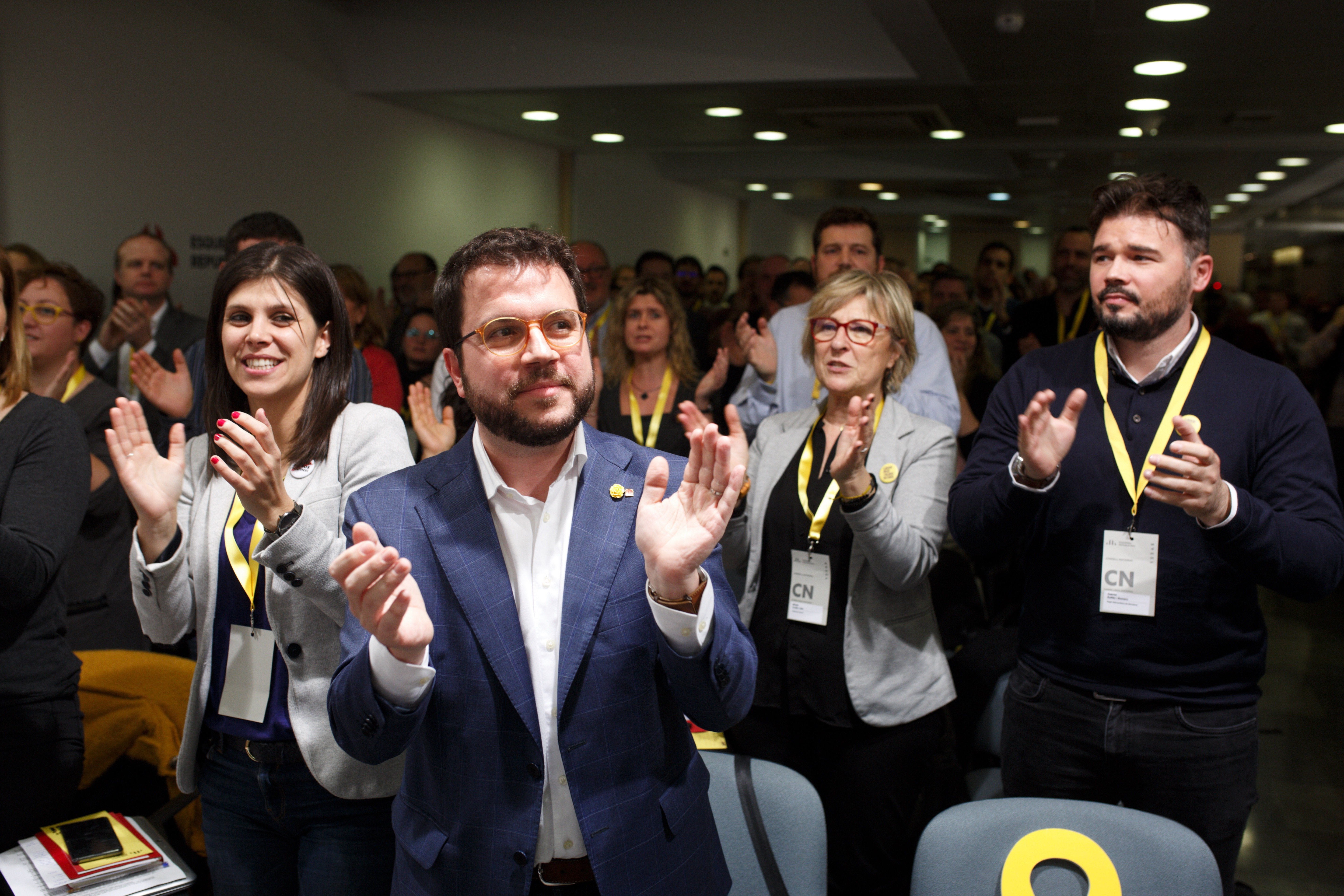Intense pressure from a significant part of the Catalan independence movement - beginning with president Quim Torra himself - to avoid the Republican Left (ERC) party from voting to allow the creation of Pedro Sánchez's proposed new Spanish government has had no effect. That is, ERC party representatives have endorsed the alliance with the Socialists (PSOE) this Thursday evening at the key meeting of the party's National Council. The result: 196 votes in favour, 4 against and 3 abstentions. At 96.5% support, overwhelming approval. This means that the party's 13 members in the Spanish Congress will abstain from voting, and the PSOE leader will cease to be "acting" prime minister after 255 days, to become fully invested as leader of a new executive on Tuesday, January 7th, at noon. "We'll take the risk," was how ERC's vice president Pere Aragonès summed up the party's stand.
Delivering the closing speech of the conclave, Aragonès praised ERC's spirit of dialogue and made it clear that the party is not going to "sell miracles": they know, he said, "that it will be difficult and that perhaps we won't achieve all we want to" but in any case they will be "totally determined" in their task. "We haven't come to fool people; we've found a tiny opening and we haven't simply stopped dumb in front of it." He stated that the understanding reached with the PSOE met the four conditions that had been set by ERC: a bilateral approach, no prohibitions on the subjects of dialogue, a clear calendar for meetings and guarantees of compliance.
The implementation of the pragmatic approach which made ERC the most voted party among Catalan voters in November's general election has provoked yet another crisis in Catalonia's coalition government. There is great annoyance among JxCat (Together for Catalonia) at the fact that their governing partner has gone ahead and explored the path of dialogue on its own. Earlier this morning, president Quim Torra told his number two in the government, Pere Aragonès, that he did not accept the agreement reached with the PSOE and insisted that any understanding reached in the future negotiation process had to end with a vote on the independence of Catalonia. Although Catalan government sources are currently tight-lipped, JxCat's Laura Borràs has even raised the possibility that this misunderstanding could lead to an early election being called in Catalonia.
Dialogue between governments, to end in a consultation
The terms reached after the ERC-PSOE talks include an agreement that the dialogue between governments will be put into motion within two weeks of the formation of the new Spanish government. As well, a key element is that, whatever agreement is reached - if one is reached - in the dialogue, it will be subject to a vote of approval by Catalans. Over the last month, efforts have intensified to find an agreed formula for the bilateral dialogue to move ERC from its initial position of voting 'no' to Sánchez's return to government, to the necessary abstention. The PSOE's first offer was to conduct the future talks in the context of the existing bilateral committee in which lesser officials discuss issues related to Catalonia's Statute of Autonomy. Finally, Sanchez and company have agreed on the creation of a new space in which the Catalan president and Spanish prime minister will sit at a table together.
The results obtained at this negotiating table, which should be formed in a matter of days after the new progressivist PSOE-Podemos government is formed, will be what is put to a vote in Catalonia, if, that is, the two sides manage to find a point of encounter between their current minimum demands: the right to self-determination on the one hand, respect for the Spanish Constitution on the other.
For Quim Torra, who, despite his great discrepancies with ERC on the issue, has always avoided ruling out a negotiation with the Spanish state, the only valid end result is the exercise of self-determination. That is, the vote at the end of the process has to be on independence from Spain.
The electoral commission, left aside
ERC chose to schedule its National Council meeting the day before Spain's Central Electoral Commission is to meet, with two key issues to be decided which could also seriously impact the political outlook: the possible immediate disqualifications of Torra from holding the office of president, and of Junqueras as an MEP. Whatever the decision, ERC sources say, nothing will interfere with the decision made by the party today.
Thanks to the ERC abstention, Pedro Sánchez will be voted in as new Spanish prime minister in the second ballot of the parliamentary investiture debate, that is, on Tuesday, January 7th. The debate will begin this Saturday at 9am. On Sunday there will be a first ballot, but it is unable to succeed, given the known disposition of votes, because more than half of the 350 members of the Spanish Congress would be required to vote 'yes' to Sánchez. In the second vote, all that is necessary is to have more votes in favour than against, and thus ERC's 13 abstentions will make the difference.

